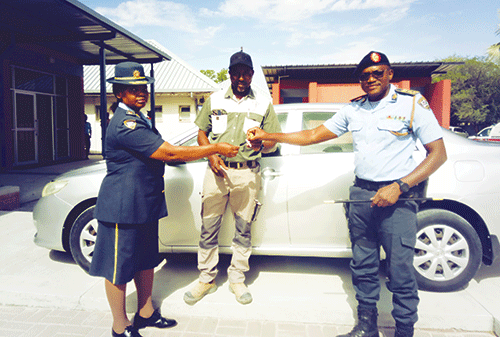The Namibian Police Force has made reasonable progress in ensuring that it carried out its mandated functions for the past 32 years.
The head of the police’s public relations division, deputy commissioner Kauna Shikwambi, said crime levels in recent years indicate manageable margins, and the Namibian Police Force further commits itself to fighting crime within the context and framework of the stated activities under the national and international agendas such as Vision 2030, NDP5, HHPs and the SADC and AU visions.
“The Namibian Police Force made significant strides and evolved tremendously over the last decades, and continues to make a significant contribution to the realisation of the national goals, as set out in the country’s guiding policies. No amount of effort can be considered to be enough in combating delinquency in society. There is always a need to improve on the way the police are carrying through their crime prevention and combating duties to ensure that the most vulnerable are protected,” she added.
Shikwambi said the police have not only remarkably executed its mandate, but has intensified efforts and has gone the extra mile to engage in activities that are beneficial to the societal development of the Namibian people.
“The Namibian Police Force, like any other institution, accepted best-practices to account for performance, and hence adopted and developed strategic plans, which is an agenda to serve and protect the Namibian nation. The force’s current strategic pillars and objectives are aimed at effective policing, therefore enhancing crime combating efforts, building partnerships to enhance stakeholders’ cooperation, and improving organisational excellence,” she indicated.
The force thus works towards making policing more effective by using technology. For starters, it launched and continues to implement the E-policing system since 2014, a project which is aimed at transforming the policing processes of NamPol from manual work to automation.
“With the demands for growth and expansion, several capital projects have been undertaken and various infrastructures have been erected in many parts of the country, especially in formerly neglected areas. National and regional headquarters were established, police stations were renovated and restructured, while specialised units and new police stations were set up,” she continued.
Shikwambi said since independence, the Namibian Police Force constructed a large number of police stations and barracks, as well as projects that are ongoing to improve the living standards and accommodation of police members so as to serve as motivation and encouragement for them to satisfactorily deliver on their mandate and also to bring police services closer to communities.
“Moreover, a lack of police holding cells to house suspects under arrest existed, and the police constructed more holding cells. Although this challenge persists, most police stations have either expanded or acquired new facilities to accommodate trial-awaiting inmates,” she added.
The Force is a member of the International Criminal Police Organisation (IPC-Interpol), and has been actively participating in Interpol’s activities.
“To support the maintenance of peace, stability and economic development globally, the Namibian Police started to assist the international community with the deployment of Individual Police Officers (IPO) as peacekeepers in the United Nations and African Union Peace Support Operations in 1998,” she observed.
Police attachés are also deployed in some of the neighbouring sister countries, namely Angola, South Africa, Zambia and Zimbabwe, “to further enhance the excellent ties of police cooperation existing between our countries. Such deployment allows for the unfettered flow of information exchanges between our law-enforcement agencies, particularly on transnational and cross-border crimes”.
A social services (wellness) sub-division was likewise established, where professional social workers were recruited and are rendering psychosocial interventions to members of the Force and their immediate families.
“With the adoption of the National Gender Policy, policing was made easy for women’s representation at the decision-making level. Hence, they are part of the senior management team”. The Force has a female major general, regional commanders, and heads of directorates and divisions. So far, four inspectors-general have led the Namibian Police; the late lieutenant general (retired) Pieter Abraham Fouché, followed by general Jesaya Raonga Andima and lieutenant general Lucas Hangula, who served until 2005. Lieutenant general Sebastian Haitota Ndeitunga was then appointed, and is serving to date.


